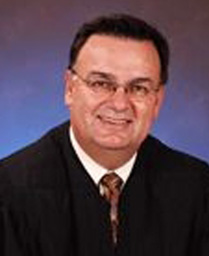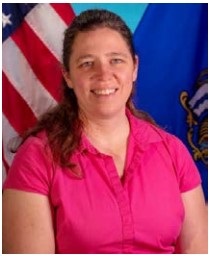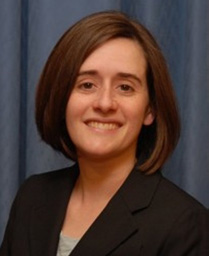 Judge James A. Morrison
Judge James A. Morrison Judge Scott L. Horne
Judge Scott L. Horne Heather Kierzek, Evidence-Based Program Manager
Heather Kierzek, Evidence-Based Program Manager Judge Carolina M. Stark
Judge Carolina M. StarkIn December 2022, a group of Wisconsin circuit court judges and Office of Court Operations staff attended a workshop in Miami to learn about an innovative mental health court program model. Judges James A. Morrison, Marinette County Circuit Court; Scott L. Horne, La Crosse County Circuit Court; Carolina M. Stark, Milwaukee County Circuit Court; and Evidence-Based Program Manager Heather Kierzek, took part in the workshop, entitled Decriminalizing Mental Illness: The Miami Model.
The workshop was organized by the National Center for State Courts (NCSC) in partnership with the Conference of Chief Justices/Conference of State Court Administrators (CCJ/COSCA). In early 2020, CCJ/COSCA formed a National Judicial Task Force to Examine State Courts’ Response to Mental Illness, focused on helping state court systems identify strategies to better address the needs of court-involved individuals with severe mental illness.
As part of the task force effort, in May 2022, Wisconsin Supreme Court Chief Justice Annette Kingsland Zeigler, Director of State Courts Hon. Randy R. Koschnick, and a contingent of Wisconsin judges, court staff, law enforcement officers, human services managers, behavioral health providers, and mental health advocates attended a regional summit in Vermont. The goal of this group was to learn more about promising practices in other states. One of the presentations at this event featured Judge Steven Leifman, who presides over a nationally-recognized mental health court program in Miami-Dade County. Leifman also spoke at the 2022 Annual Meeting of the Wisconsin Judicial Conference.
After determining that a small number of repeat offenders continued to cycle through jail and public mental health facilities with little or no improvement, Leifman, Associate Administrative Judge in the Florida’s Eleventh Judicial Circuit, helped establish a mental health diversion program. By working in partnership with his fellow judges, public defenders, prosecutors, law enforcement officers, and mental health treatment providers, he started the Criminal Mental Health Project, or CMHP.
The CMHP program is based on the Sequential Intercept Model (SIM), which is focused on how individuals with mental health and substance abuse disorders move through the criminal justice system, and emphasizes early intervention and support services.
The Wisconsin group praised the Miami approach.
“The Miami Model demonstrates the importance of incorporating evidence-based decision making when designing a program.” Kierzek said. “By embracing a systems-based approach and targeting a specific, high-need population, the mental health court program can really focus on addressing the needs of participants.”
A further component of the CMHP is a centralized facility to provide crisis stabilization services, outpatient programming, and transitional housing for individuals with serious mental illnesses or substance abuse disorders. The facility, the Miami Center for Mental Health and Recovery, is slated to open later this year.
Judge Horne, who chairs the Planning and Policy Advisory Committee (PPAC) subcommittee, which examines critical issues facing the court system said that even prior to the COVID-19 pandemic, judges have expressed concerns about mental health – both of the judiciary and litigants.
“The main components of the Miami program – early assessment and immediate referral for services, effective case management, peer support to keep participants on track, medication management, vocational training, and safe housing – are all within reach of most counties in Wisconsin. There is no reason Wisconsin can’t achieve similar results,” Horne said. Judge Morrison, who presides over a mental health court program in Marinette County, said Wisconsin can learn a lot from the Miami Model: “It was exciting to see how so many different community partners contribute to the success of the mental health court program in Miami. We have the tools to do great work here in Wisconsin if we focus our resources where they will do the most good.”
Even though the Judiciary may not be able to create the resources for effective prevention, intervention and treatment needed in every community, Morrison said, “judges can help usher in the cultural change essential to addressing this problem.”
Judge Stark and the other participants in the workshop returned to Wisconsin with a clear sense of focus and purpose.
“The Miami Model demonstrates that the Judiciary can play an effective leadership role in bringing meaningful change to how the courts, the criminal justice system, and the community respond to mental health needs that affect safety and quality of life for individuals and for the community as a whole,” Stark said.
Third Branch eNews is an online monthly newsletter of the Director of State Courts Office. If you are interested in contributing an article about your department’s programs or accomplishments, contact your department head. Information about judicial retirements and judicial obituaries may be submitted to: Sara.Foster@wicourts.gov

